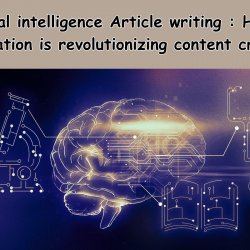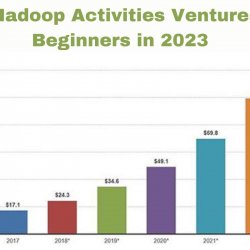How Artificial Intelligence Used in Social Media Marketing?

 Introduction
Introduction
Welcome to the world of social media marketing, where the use of artificial intelligence (AI) is revolutionizing the way businesses reach and engage with their target audience. With advancements in technology, AI has become an essential tool for successful social media marketing campaigns. In this blog section, we will dive into how AI is used in social media marketing and how it can benefit your business.
First, let’s start by understanding what artificial intelligence is. In simple terms, AI refers to computer systems that can perform tasks that usually require human intelligence. These tasks include learning from data, recognizing patterns, and making decisions based on that data. With the help of AI, machines can now replicate human actions and even outperform them in some cases.
So how does AI come into play in social media marketing? Well, the answer lies in the vast amount of data available on social media platforms. Every day, millions of people share their thoughts, interests, and behaviors on various social media channels. This data provides businesses with invaluable insights into their target audience’s preferences and behaviors. However, manually analyzing this huge amount of data is nearly impossible for humans.
This is where AI comes into play – it can quickly process large volumes of data and extract valuable insights that marketers can use to create more targeted and personalized campaigns. For example, AIr powered tools can analyze user behavior on social media and determine what type of content they are most likely to engage with. This information allows marketers to create tailored content that resonates with their audience.
Understanding Artificial Intelligence in Social Media Marketing
- Data analysis and insights: AI enables the collection, processing, and analysis of large volumes of data from social media platforms, providing valuable insights into user behavior, preferences, and trends. These insights can inform the development of targeted marketing campaigns and personalized content strategies.
- Personalization and targeting: AI algorithms can analyze user data to create personalized experiences for social media users, tailoring content, ads, and recommendations based on individual preferences and behaviors. This personalized approach enhances user engagement and fosters stronger connections between brands and their target audiences.
- Automated customer interactions: AI-powered chatbots and virtual assistants can engage with users in real time, providing prompt and personalized responses to inquiries, comments, and messages on social media platforms. These automated interactions improve customer satisfaction, streamline communication processes, and strengthen brand-consumer relationships.
- Content creation and curation: AI tools can assist in generating and curating relevant and engaging content for social media marketing campaigns. They can suggest topics, create visuals, and recommend posting schedules based on user preferences and engagement patterns, enabling marketers to deliver more compelling and impactful content to their audiences.
- Performance optimization: AI can continuously monitor and analyze the performance of social media marketing campaigns, providing actionable insights and recommendations for optimizing ad targeting, content strategies, and overall marketing efforts. AI-driven optimization helps improve campaign effectiveness, increase ROI, and achieve better business outcomes.
- Competitive analysis: AI tools can monitor competitors’ social media activities and performance, providing valuable insights into their strategies, content effectiveness, and audience engagement. This competitive analysis helps businesses identify opportunities for improvement and refine their own marketing strategies to stay ahead in the competitive landscape.
Benefits of Using Artificial Intelligence in Social Media Marketing
- Personalized user experience: AI enables the analysis of user data, preferences, and behavior to deliver personalized content and recommendations, fostering a more engaging and relevant user experience. This personalization can increase user satisfaction and loyalty.
- Enhanced targeting and segmentation: AI algorithms can analyze large datasets to identify and target specific audience segments based on their interests, demographics, and online behavior. This targeted approach can improve the effectiveness of marketing campaigns and lead to higher conversion rates.
- Real-time customer interaction: AI-powered chatbots and virtual assistants can provide immediate and personalized responses to customer inquiries, improving customer satisfaction and engagement. These interactions can help businesses address customer concerns promptly and build stronger relationships with their audience.
- Content optimization: AI can analyze user preferences and behavior to suggest content topics, formats, and posting schedules that are more likely to resonate with the target audience. This can lead to the creation of more engaging and relevant content, ultimately increasing user engagement and brand awareness.
- Data analysis and insights: AI can process and analyze large volumes of social media data to provide valuable insights into consumer trends, preferences, and sentiment. These insights can help marketers make data-driven decisions, optimize their strategies, and identify new opportunities for business growth.
- Automated content curation and scheduling: AI tools can automatically curate and schedule content based on user preferences and engagement patterns. This automation can streamline content management processes, save time, and ensure consistent and timely delivery of content across various social media platforms.
- Competitive analysis: AI can monitor and analyze competitors’ social media activities, providing valuable insights into their strategies, content performance, and audience engagement. This information can help businesses refine their own marketing strategies and stay competitive in the market.
- Ad targeting and optimization: AI can improve the targeting of social media advertisements by analyzing user behavior and preferences. It can also optimize ad performance by continuously monitoring and adjusting ad campaigns based on real-time data, leading to better ROI and conversion rates.
Examples of How AI is Used in Social Media Marketing
Artificial Intelligence, or AI, is a rapidly advancing technology that has the potential to revolutionize many industries. One area where it has already made a significant impact of Ai is in social media marketing. With its ability to analyze data, learn patterns, and make decisions, AI has become an essential tool for businesses looking to enhance their social media presence. In this blog section, we will take a closer look at some examples of how AI is used in social media marketing and the benefits it brings.
Cost efficiency is one of the primary reasons why businesses are turning to AIpowered social media marketing tools. These tools can automate tasks such as content creation, posting, and monitoring, reducing the need for manual labor. This not only saves time but also cuts down on costs for businesses. As a business owner or marketer, you no longer have to spend hours creating and scheduling posts or manually analyzing data to understand what works best for your audience.
Moreover, AI can also help businesses target their audience more effectively through personalized marketing strategies. Social media platforms collect vast amounts of user data every day, which can be overwhelming for human marketers to analyze. However, with the help of AI algorithms, this data can be quickly processed and used to create personalized content and messaging for different segments of your target audience.
For instance, if you run an online clothing store and have a diverse customer base with different preferences and styles, AI algorithms can analyze their behavior patterns on social media to determine which type of content would resonate with them the most. This could include everything from personalized product recommendations to targeted ad campaigns based on their interests and buying habits.
Challenges and Limitations of Artificial Intelligence in Social Media Marketing
- Data privacy concerns: AI in social media marketing relies heavily on user data for personalization and targeting. However, the collection and use of personal data can raise privacy concerns among users, leading to potential backlash and regulatory scrutiny.
- Algorithm biases: AI algorithms may inadvertently incorporate biases present in the data they are trained on, leading to biased targeting, content recommendations, or ad placements. This can result in discriminatory or inappropriate content delivery, potentially harming a brand’s reputation and alienating certain user groups.
- Over Reliance on automation: Over Reliance on AI-driven automation can lead to a lack of human oversight and personal touch in customer interactions. This may result in a disconnect between the brand and its audience, leading to reduced trust and engagement.
- Limited understanding of context: AI may struggle to understand the nuanced context of user interactions and may misinterpret or misclassify user sentiments or intentions. This can lead to inappropriate responses, misaligned content recommendations, and a negative user experience.
- Dynamic and unpredictable social media landscape: Social media platforms and user behavior are constantly evolving, making it challenging for AI models to adapt quickly to changing trends and preferences. AI algorithms may lag behind real-time developments, impacting the relevance and effectiveness of marketing strategies.
- Complexity of measuring ROI: While AI can optimize various aspects of social media marketing, measuring the return on investment (ROI) for AI-driven marketing campaigns can be complex. Determining the direct impact of AI on key performance indicators (KPIs) such as engagement, conversions, and brand perception requires sophisticated analytics and attribution models.
- Dependency on quality data: AI models require high-quality and relevant data to produce accurate insights and predictions. Poor data quality, incomplete datasets, or biased data inputs can compromise the effectiveness and reliability of AI algorithms, leading to erroneous conclusions and suboptimal marketing strategies.
- Cost and technical expertise: Implementing AI in social media marketing requires significant investments in technology, infrastructure, and skilled personnel. Small and medium-sized businesses may face challenges in affording and effectively utilizing AI tools, limiting their ability to compete with larger enterprises.
You can also read:
star agile data science reviews






Ingen kommentarer endnu